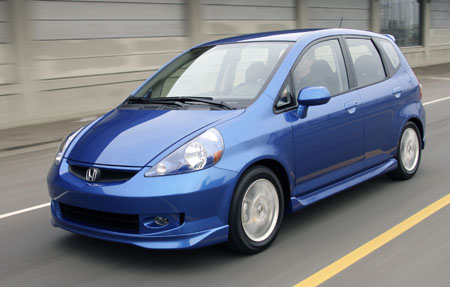
No one is debating that it’s been a hard couple of months for everyone in the auto industry. Some days it seems like no one is buying anything. Japan in particular has been rocked by a strong Yen and plummeting exports. This means that not only is the country sending less vehicles abroad, but that the money they receive on every sale is worth less in the Japanese domestic market.
However, there seem to be a few rays of light at the end of the tunnel. Many will (naturally) point to the Toyota Prius and Honda Insight as representatives of the new class of green car in North America, but I think last month’s sales figures from Honda paint a different picture. While hybrid sales are still doing comparably well in the grand scheme of things, small, cheap, and fuel-efficient cars like the Honda Fit are surging forward in the automaker’s lineup.
What does this mean? I think it represents a shift in the American car-buying mindset. Times are tough, and people are not only trying to save money on gas, but they’re cutting the fat. Do you really need to spend that extra $10,000 on a Prius when you could get a small car that is still among the most efficient in its class?
What do you think? Am I premature in thinking that hybrids are falling by the wayside in the face of more conventional conservation, or will Honda see a resurgence of hybrid sales with their more affordable Insight?
Popularity: 5% [?]




{ 3 comments }
We hit a Honda and a Toyota Dealer over the weekend just to see what the prices were and if there were any visible effects from the Recession going on there. We saw no real price drop for the Fits we looked at, but what really hit us was the MPG they were advertising. A Fit was rated in the 27 City/35 Highway and the Toyota Camry Hybrid was almost the same. 27/35 for a Hybrid? My 97 Honda Accord gets about that now. I think the resistance to these is has been generated by the manufacturers, maybe in attempt to “hedge their bets”.
No significant increase in fuel economy for hybrids while significantly increasing the price for consumers to me is clearly an attempt to kill off the Hybrid, the same way they did the EV-1. Automakers want people to make the same “wait a minute” moment in everyone, and then hope that they conclude that Hybrids are a joke and go back to buying the more profitable conventional cars. Hybrids are clearly capable of much greater efficiency, but the industry (even Toyota it seems) is dragging its feet because it prefers the profit structure of the existing car models.
Hi Ian,
Thanks for the comment. While I agree that the motivation when looking at those EPA number is clearly to go for the much cheaper Honda Fit, you have to consider that they are very different cars in terms of size, power, and market. If you were to compare the Fit to the new Honda Insight I think you would find that among comparable vehicles there is a good fuel economy boost to be had with the increased price (and that premium is getting smaller every day).
I agree about comparing like model cars, but I guess my point was that neither the Fit nor the Camry Hybrid (pretty sure it was Camry) significantly exceeds the mileage on my 97 Accord, and I am starting to believe that is by design. In my analysis, modders have far exceeded the paltry increases in fuel economy put forth by the auto industry, using the automakers own technology, so clearly if the MPG ratings aren’t increasing, it is because the manufacturers don’t want them to increase.
As I understand it, automakers have resisted fuel efficiency because those vehicles have a much smaller profit margin on them, and have attempted in the past to claim it was consumers that shunned the improvements. It seems that they are trying to continue this strategy, or at least were up to this model year, by creating vehicles with nominal efficiency gains attached to significantly higher price tags to mold the consumer into a mindset equating Hybrids as “not worth the extra cost.”
Comments on this entry are closed.